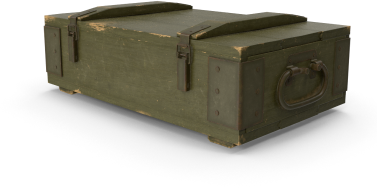Following the drive to the Rhine the division was assigned to the 3rd Army on March 29th. Advance units of the 3rd Army having made the original river crossing a few days earlier, the 71st Infantry Division moved over the river to cover the rear of the XII Corps. In the accomplishment of this mission occurred the battle with the Nazi 6th SS Mountain Division Nord.
Note: The 6th SS Mountain Division Nord (German: 6. SS-Gebirgs-Division Nord) was a World War II Mountain infantry division of the Waffen-SS, the military wing of the German Nazi Party, primarily consisting of ethnic Germans along with some Norwegian and Swiss volunteers. It was the only Waffen-SS division to operate in the Arctic Circle.
Seizing the advantage resulting from an extremely fluid tactical situation the Nazi division forced its way out of a pocket and attempted to fight through to the XII Corps Headquarters. It settled on communication lines some twenty miles behind the command post.
Early on April 1st information was received that approximately 700 enemy troops were entering the Division's zone. Contact was made with the enemy on that date by the 71st Reconnaissance Troop. A battalion of the 14th Combat Team then moved to the vicinity of Altenstadt, split the enemy forces and caused them to disperse into a heavily wooded area. Prisoners of war taken were identified as members of the 6th SS Mountain Division Nord.
 Dead SS Soldiers
Dead SS Soldiers
The 1st Battalion of the 66th Infantry Regiment was pulled out to protect the Corps command post at Lauterbach because of the imminent threat to that vital installation.
The next day, April 2nd, the 2nd and 3rd Battalions of the 14th Infantry Regiment launched a coordinated attack supported by artillery, tanks, and tank destroyers. The 2nd Battalion of the 66th Infantry Regiment, reinforced with tanks, and infantry cannon, established a block to the south and east to catch SS attempting to escape in that direction.
Enroute to establish this block the 2nd Battalion encountered such strong opposition in Waldenburg and a woods southeast of the town that the 3rd Battalion of the 66th Infantry's Regiment was assigned the task of driving through Spielburg and Streitburg to launch an attack against the town of Leisenwald in an enveloping move. Faced by 1,000 German troops the 3rd Battalion fought from house to house until 1000 pm before the town was taken.
In the meantime, because the division had the multiple mission of protecting the Corps' right flank, its rear and vulnerable left flank, the 5th Infantry Regiment, reinforced, was committed in order to clear the main supply route as quickly as possible.
Note: Early in the morning of April 2nd, the 5th Infantry Regiment seized Büches and Büdingen, and coordinated its attack with the 14th Infantry Regiment.
Pressure continued the next day driving the 6th SS Division into Budinger Wald to the east. Roadblocks, established to the north and northeast, completed the encirclement. Combined action by all the units concerned, Infantry, Artillery, Tanks, Tank Destroyers, and Cavalry, brought about complete destruction and capture of the 6th SS Mountain Division Nord. A total of 2700 SS were taken prisoner by the 71st Infantry Division in this action.
The captured enemy provided the division with its first look at a large number of prisoners - fallen supermen. A month later this group was deemed but a paltry handful when compared with the numbers that surrendered daily. But in that group were found examples of each individual temperament; they were the first of types that would be seen again and again.
Arrogance, bitterness, and hate showed on the faces of some; others mirrored confusion and disbelief, as though despite considerable effort the situation lay beyond comprehension. In the faces of many lay the signs of a deep inward fear; while in some could be read a feeling of relief that now, for them, it was over, and safety was at hand.
In a letter written to General Wyman shortly before relinquishing command of the XII Corps General Eddy said:
"Before I leave, I want you and your command to know how thoroughly satisfying your brief service was under this command. Few divisions have acquired the spirit of veterans as quickly and as thoroughly as the 71st Infantry Division. At a period in which our lines of communication were dangerously threatened by the SS Mountain Division Troops, you joined the Corps and proceeded to eliminate this threat with skill and dispatch. Your subsequent advance into Germany is surely the auspicious beginning of a fine combat record."
With the division now prepared for further advance, sweeping operations by the line companies were resumed in an easterly direction. On April 5th a division command post was established in Fulda.
 Civilians fight fire as the city hall of Fulda goes up in somke after the capture of the city by the division
Civilians fight fire as the city hall of Fulda goes up in somke after the capture of the city by the division
The city of Fulda had capitulated to another unit. The 71st Infantry Division moved into the area as a relieving outfit, and to the men of the line it meant a chance for a needed rest, an opportunity for bathing, and a recheck of personal equipment. Here also the temporary halt in the progress to the east enabled a group of replacements from a "repple- depple" west of the Rhine to overtake the Division and be dispersed throughout its various units.
 Civilians of Fulda are given a shakedown by Mp's for weapons and army papers
Civilians of Fulda are given a shakedown by Mp's for weapons and army papers
As each handful of new men found their newly assigned outfit battle tested members reacted in the accepted fashion. You were glad to see them, and told them so, but you did feel a little superior for most of the new men didn't yet know what it was to be fired upon by an opponent designing to kill. And you remembered the way it had been when you relieved the 100th Infantry Division in France. The newcomers were products of a similar cycle of training to the one you had known back at Benning, the close combat course, the infiltration run, the village fighting, but they still had to discover, just as you had (though you had known it would be), that this was more than a dry run. So, you welcomed them into your ranks, and the stories, and the tales of what had gone on before, were made a little better, the points drawn a little finer, than they would have been there not new ears in the bull session circles.
But in a short time, the new men were no longer new. They too knew what the real thing was like, and day followed day, and soon you couldn't remember" if a man had come in as a replacement or had been around at Sand Hill.
The 71st Infantry Division remained static in the neighbourhood of Fulda for two days. Then information was received reporting a concentration of enemy troops in the vicinity of Meiningen. This city, in the centre of a resort area much favored by residents of Berlin back in the days when there had been time and opportunity for pleasure seeking became the next objective. The movement forward began on April 6th, 1945.
 66th Infantry Regiment troops file through the streets of Meiningen after its capture
66th Infantry Regiment troops file through the streets of Meiningen after its capture
Some mortar and small arms fire against forward elements of the division was employed by the Germans, but chief reliance was placed on the passive use of mines, roadblocks, and demolished bridges to hinder the advance. The mopping up proceeded with dispatch, and two days later, on April 8th, Meiningen was occupied. There had been no contact with any fully organized enemy in strength.
From Meiningen the route turned south and east with sweeping operations continuing. A sweeping operation isn't an assault on a prepared line of defense. But it's a dirty job, nevertheless you walk mile after mile, through woods, and brush, and small towns. The fear and tenseness of a major assault rides your shoulders, for the next dense clump may conceal crouching, hiding figure about to squeeze the trigger and send a hail of death in your direction.
The little cluster of buildings at the turn of the road ahead may mark the spot of a last ditch stand by a fanatical group, aware of approaching defeat, but determined to make the end costly. Should you be one of those to topple under the "impact of a sniper's shot it makes no difference that it has not occurred in an action that rates headline space at home. On the war maps in the daily papers of your hometown the black arrow marking the drive into Germany very often extended beyond your position, but here in a "Liberated" area life could be, and was, snuffed out suddenly.
Many of the small towns in the line of march fell captive without a single shot having been fired. From the windows, the doorways, and the flagstaff’s, hung the symbol of surrender: a sheet, a tablecloth, a pillowcase, or merely a tattered piece of white rag.
Very rarely, at first, did you see any civilians on the streets of a newly surrendered village or town. Even the kids had disappeared. An adventurous one or two might come to the front of a yard and hang on the fence to watch your approach, but an anxious parent soon appeared in a doorway and sternly ordered these exceptions into the house.
Written by Pierre Fallet

















